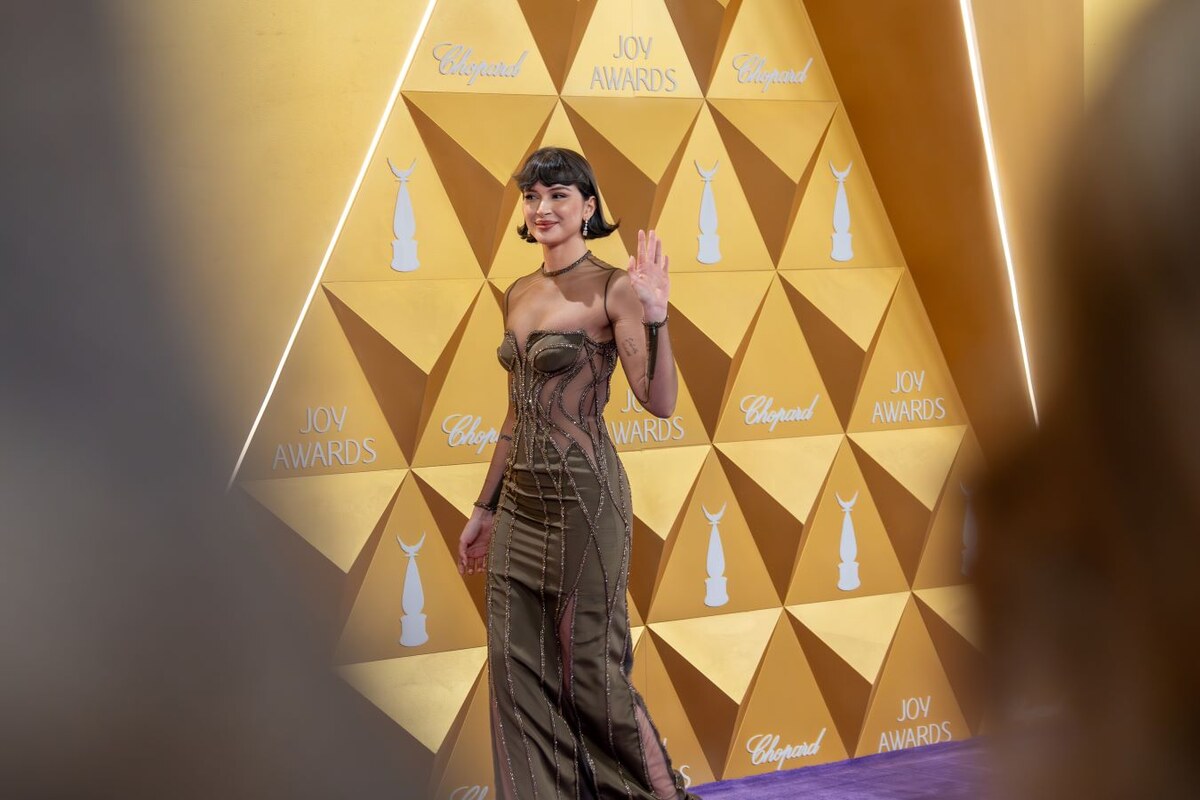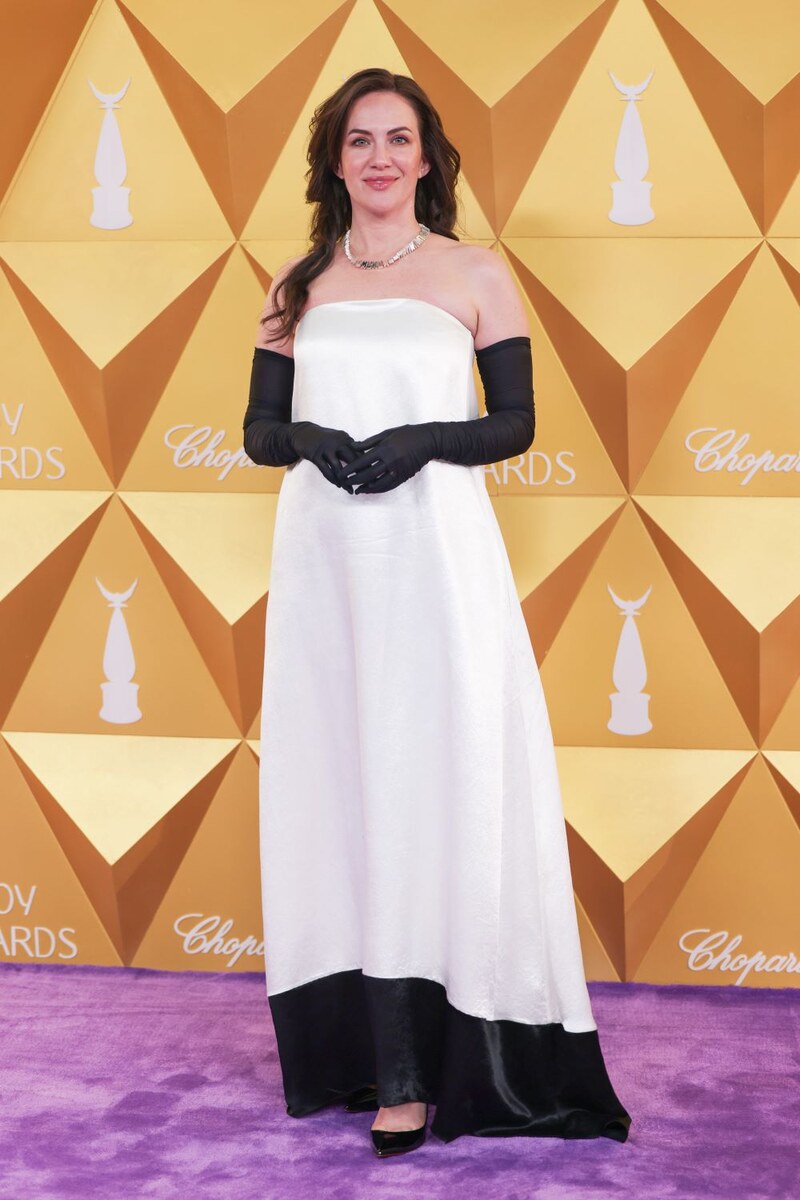MALMO, Sweden: Swiss singer Nemo won the 68th Eurovision Song Contest early Sunday with “The Code,” an operatic pop-rap ode to the singer’s journey toward embracing a nongender identity.
Switzerland’s contestant beat Croatian rocker Baby Lasagna to the title by winning the most points from a combination of national juries and viewers around the world. Nemo, 24, is the first nonbinary winner of the contest that has long been embraced as a safe haven by the LGBT community. Nemo is also the first Swiss winner since 1988, when Canadian chanteuse Celine Dion competed under the Swiss flag.
“Thank you so much,” Nemo said after the result from Saturday’s final was announced soon after midnight. “I hope this contest can live up to its promise and continue to stand for peace and dignity for every person.”
At a post-victory news conference, Nemo expressed pride in accepting the trophy for “people that are daring to be themselves and people that need to be heard and need to be understood. We need more compassion, we need more empathy.”
Nemo’s victory in the Swedish city of Malmo followed a turbulent year for the pan-continental pop contest that saw large street protests against the participation of Israel that tipped the feelgood musical celebration into a chaotic pressure cooker overshadowed by the war in Gaza.
Hours before the final, Dutch competitor Joost Klein was expelled from the contest over a backstage altercation that was being investigated by police.
Nemo — full name Nemo Mettler — bested finalists from 24 other countries, who all performed in front of a live audience of thousands and an estimated 180 million viewers around the world. Each contestant had three minutes to meld catchy tunes and eye-popping spectacle into performances capable of winning the hearts of viewers. Musical styles ranged across rock, disco, techno and rap — sometimes a mashup of more than one.
Israeli singer Eden Golan, who spent Eurovision week in Malmo under tight security, took the stage to a wall of sound — boos mixed with cheers — to perform the power ballad “Hurricane.” Golan shot up the odds table through the week, despite the protests that her appearance drew, and ended in fifth place behind Nemo, Baby Lasagna, Ukrainian duo alyona alyona & Jerry Heil, and French singer Slimane.
Eurovision organizers ordered a change to the original title of her song, “October Rain” — an apparent reference to the Oct. 7 Hamas attack that killed about 1,200 people in Israel and triggered the war in Gaza.
The show was typically eclectic Eurovision fare, ranging from the pop-zombie folk hybrid of Estonia’s 5Miinust x Puuluup to the folk-inflected power pop of Greece’s Marina Satti and Armenia’s Ladaniva and the goofy 1990s nostalgia of Finland’s Windows95man, who emerged from a giant onstage egg wearing very little clothing.
Britain’s Olly Alexander offered upbeat dance track “Dizzy,” while Ireland’s gothic Bambie Thug summoned a demon onstage and brought a scream coach to Malmo, and Spain’s Nebulossa boldly reclaimed a term used as a slur on women in “Zorra.”
Nemo had been a favorite going into the contest, alongside Baby Lasagna, whose song “Rim Tim Tagi Dim” is a rollicking rock number that tackles the issue of young Croatians leaving the country in search of a better life.
The contest returned to Sweden, home of last year’s winner, Loreen, half a century after ABBA won Eurovision with “Waterloo” — Eurovision’s most iconic moment. ABBA did not appear in person in Malmo, though their digital “ABBA-tars” from the “ABBA Voyage” stage show did.
A trio of former Eurovision winners — Charlotte Perrelli, Carola and Conchita Wurst — performed “Waterloo” in tribute.
Though Eurovision’s motto is “united by music,” this year’s event has proven divisive. Protests and dissent overshadowed a competition that has become a campy celebration of Europe’s varied — and sometimes baffling — musical tastes and a forum for inclusiveness and diversity.
Thousands of pro-Palestinian demonstrators marched for the second time in a week on Saturday through Sweden’s third-largest city, which has a large Muslim population, to demand a boycott of Israel and a ceasefire in the seven-month Gaza war that has killed almost 35,000 Palestinians, according to the health ministry in the Hamas-run territory.
Several hundred gathered outside the Malmo Arena before the final, with some shouting “shame” at arriving music fans, and facing off with police blocking their path. Climate activist Greta Thunberg was among those escorted away by police.
Klein, the Dutch performer, was ejected from the competition after a female member of the production crew made a complaint, competition organizer the European Broadcasting Union said. The 26-year-old Dutch singer and rapper had been a favorite of both bookmakers and fans with his song “Europapa.”
Dutch broadcaster AVROTROS, one of dozens of public broadcasters that collectively fund and broadcast the contest, said that as Klein came offstage after Thursday’s semifinal, he was filmed without his consent and in turn made a “threatening movement” toward the camera.
The broadcaster said Klein didn’t touch the camera or the camera operator, and called his expulsion “disproportionate.”
Tensions and nerves were palpable in the hours before the final. Several artists were absent from the Olympics-style artists’ entrance at the start of the final dress rehearsal, though all appeared at the final.
Several competitors made reference to peace or love at the end of their performances, including France’s Slimane, who said: “United by music for love and peace.”
Nemo said the Eurovision experience had been “really intense and not just pleasant all the way.”
“There were a lot of things that didn’t seem like it was all about love and unity, and that made me really sad,” Nemo said. “I really hope that Eurovision continues and can continue to stand for peace and love in the future. I think that needs a lot of work still.”
Switzerland’s Nemo wins 68th Eurovision Song Contest after event roiled by protests over Gaza war
https://arab.news/97w6r
Switzerland’s Nemo wins 68th Eurovision Song Contest after event roiled by protests over Gaza war

- Nemo, 24, is the first nonbinary winner of the contest that has long been embraced as a safe haven by the LGBT community
Review: ‘A Man on the Inside’ – comedy series on Netflix

- Dressed in impeccably pressed suits and armed with plenty of trivia about architecture, he saunters in, shyly at first, then begins to find his footing
“A Man on the Inside” is an eight-episode comedy series that premiered on Netflix in 2024, blending humor, heartfelt storytelling and a touch of mystery.
After retired professor and widower Charles Nieuwendyk (Ted Danson of “The Good Place”) speaks to his concerned only daughter, Emily (Mary Elizabeth Ellis), he decides to make a change. A year after her mother’s death, Emily encourages her father to find a new purpose; to take a class or try a new hobby.
With a love of newspaper cutouts (he would often clip and mail interesting articles to Emily), Charles finds an intriguing yet vague job listing in the classified section.
He is soon recruited by Julie, a private investigator (Lilah Richcreek Estrada), who reluctantly enlists his help to uncover the whereabouts of a stolen necklace in a local San Francisco retirement community.
At its heart, the series explores the evolving father-daughter relationship between Charles and Emily, along with her husband and three teenage sons.
It also shows Charles making friends and trying out new things at an age and stage in his life when he thought life ended with his wife’s death.
Dressed in impeccably pressed suits and armed with plenty of trivia about architecture, he saunters in, shyly at first, then begins to find his footing.
“He’s like if a podcast wore a suit,” one staff member aptly describes him.
Then another valuable item is stolen from the community. Then another.
Stephanie Beatriz (“Brooklyn Nine-Nine”) co-stars as Didi, the sharp and determined managing director of the retirement community, bringing her trademark wit and charm to the role.
The whodunit-style show examines coping with grief, lost love, and the excitement of new beginnings from the perspective of seniors.
Whether you’re here for the mystery, the comedy, or its effortless charm, the series delivers a family-friendly binge-worthy viewing experience.
Andrew Garfield says tear-jerker film ‘We Live in Time’ is everyone’s story

DUBAI: It is no secret that Andrew Garfield’s latest movie, John Crowley’s “We Live in Time,” now in cinemas across the Middle East, is a tear-jerker that will pull at your heartstrings from Scene 1.
Beginning with the cancer diagnosis of co-main character Almut (Florence Pugh), the story then follows her back and forth through time to tell the story of her relationship with Tobias (Garfield), from their first encounter after a road accident to the birth of their daughter at a filling station and more.

“I think the point of this film is that it is everyone’s story,” Garfield told Arab News. “I think after any human being lives a certain amount of time, if they’re lucky, they get to experience terrible loss. And I know that that’s a strange way of phrasing it, but I do see it as a privilege to love deeply and therefore to lose terribly, to lose each other, whether it’s a partner or a mother or a father or a friend.”
While over the past few years Garfield has been on an on-and-off break from filming in an attempt to know himself better, the script from Justine Wright lured him back to set.
“I was in a very peaceful, contemplative place in my life, and reflecting on everything and wanting to be creative, but not necessarily wanting to be on a film set. But then, you know, reading the script, I thought, ‘Oh, this will be a very natural creative process,’” he said.
“There was a certain amount of letting go, but it was a letting go of a different kind. It was a letting go of too much overthinking. It felt like a very natural letting go, getting out of the way of not working too hard, letting the moment define the moment, letting myself be filled up, and trusting that the moment was enough,” said Garfield, who lost his mother to cancer in 2019.
His subsequent journey of self-discovery has further helped his craft as an actor.
“This is one of the privileges of being an actor, I think, being an artist, but particularly about being an actor is that, depending on the roles you get to play, you’re accessing and finding and inhabiting parts of yourself that you didn’t know were there and capabilities that you didn’t know you had. Dark and light, expressive, expansive and destructive and shady. So, yes, I’m definitely drawn to knowing myself as thoroughly as possible,” Garfield said.
“And yeah, I’m definitely seeking out as much of being in authentic relationship to myself, and therefore others, and therefore the world, and therefore my work as possible. And sometimes it’s really, really painful, because there are aspects of myself that I wish I didn’t have, like all of us. But the danger is, I think, if we try to exile those parts of ourselves, we end up being in denial of what we’re capable of, and then we end up really doing damage and electing the wrong people to lead countries, etc.
“So, yeah, it feels important to me to find all of those different parts and own them and welcome them; and therefore be able to govern them and not be governed by them, because they’re just unconscious drives.”
Christina Aguilera, Michael Buble perform at Riyadh’s Joy Awards

- Joy Awards are Saudi Arabia’s largest event honoring the Arab world’s leading artists and their achievements
- Winners were selected based on public voting through an application launched by the General Entertainment Authority
RIYADH: The annual Joy Awards honored Arab talent with musical performances that serenaded a star-studded guest list at Riyadh’s Kingdom Arena on Saturday.
The award show opened with a concert by Christina Aguilera, who performed “The Voice Within” and her hit song “Genie in a Bottle.”

Musical icons Mohammed Abdo and Andrea Bocelli performed together, blending Gulf and Italian sounds.

Lebanese singer Wael Kfoury and Canadian artist Michael Buble collaborated on a striking rendition of Frank Sinatra’s “My Way,” performed in both English and Arabic.
Amanda Seyfried, Morgan Freeman and Matthew McConaughey were among the international and local celebrities who showcased their dazzling ensembles on the ceremony’s iconic lavender carpet on Saturday.

As a tribute to her first visit to the Kingdom, US actress Kate Siegel attended the ceremony wearing a pearly white dress with black drapings by Saudi brand Abadia.
“I picked it because I wanted to represent Saudi Arabian designers and fashion, especially here in Riyadh, which is such an upcoming hot spot for Saudi Arabian fashion,” she said.

Lebanese actress Nawal Kamel arrived in a black and silver studded gown designed by her go-to Lebanese fashion designer, Joelle Nemnum.
“I can’t believe I’m here. I’m very excited to meet the (Saudi) people up close. I know many people from Lebanon but being here and seeing the locals, who are so different and incredible, is amazing. They (Saudis) are so kind and welcoming — they truly lift you up and take care of you. I’m so grateful to be here and to witness the Joy Awards,” she said.

Held at the Kingdom Arena, the Joy Awards are Saudi Arabia’s largest event recognizing and honoring the Arab world’s leading artists and their achievements. The event is part of Riyadh Season and is co-organized by MBC Group.

The winners were selected based on public voting through an application launched by the General Entertainment Authority. The list included candidates across various categories. The nominees were carefully chosen by specialized committees based on their efforts and achievements over the past year.
Review: ‘Unstoppable’ is a predictable, feel-good outing

- Story of Anthony Robles, championship-winning wrestler born with one leg, makes for a satisfying biopic
LONDON: It is easy to forget that, sometimes, all you want from a movie is a healthy dose of good vibes — and few genres are better suited to that than the sports biopic.
The film “Unstoppable” tells the real-life story of Anthony Robles, an American wrestler who won the 125-pound (57 kg) US National college wrestling championship in 2011 despite being born with one leg.
Directed by William Goldenberg (a storied screenwriter and editor, making his directorial debut here), “Unstoppable” stars Jharrel Jerome (“Moonlight,” “When They See Us”) as Robles, with Jennifer Lopez as his mother Judy and Bobby Cannavale as his stepfather Rick.

Already a talented high-school wrestler, Robles misses out on his dream college scholarship, but opts instead to pay to attend Arizona State University and win a place on their feted wrestling team.
Despite dealing with Rick’s abusive behavior at home, Robles continues to win over his teammates. And, backed by his mom’s unending belief, and that of his high-school coach (played by Michael Pena), he proves himself not only worthy of his spot, but an athlete capable of performing on the national stage.
Here is the thing with sports movies (or the good ones, at least), you have to really lean into every single cliche and embrace all the heartstring-plucking tropes. Because, if you do — and if the film has a decent cast doing an earnest job — the payoff is worth it.
And so it is with “Unstoppable,” a movie that is as determined as its real-world protagonist. Sure, there are a few story beats that get teased and then dropped. Sure, the by-the-numbers buildup to the climactic showdown is beyond predictable.
But this movie has a stellar lead performance from Jerome (helped by absolutely seamless effects and stunt work, which sees Robles himself performing some of the wrestling sequences), and an immensely talented supporting cast.
Lopez, Cannavale and Pena are all great, but Don Cheadle also deserves his share of the plaudits for his turn as Robles’ college coach and mentor.
Is this the most sophisticated exploration of the world of collegiate wrestling? Nah. But is it a heartwarmingly decent movie that will make you feel good? Absolutely.
Courchevel Boulevard World brings skiing experience to Riyadh

- Ski zone provides the thrill of the slopes in the heart of the city
- Around 200 people per day visit Riyadh’s new wintry attraction
RIYADH: A new attraction is thriving in Riyadh at the Courchevel zone at Boulevard World, where visitors can indulge in an authentic skiing adventure.
This unique attraction which opened in December brings the thrill of the slopes to the heart of the city, allowing both beginners and seasoned skiers to enjoy the winter sport under the guidance of professional trainers.

These skilled professionals want to do more than teach. “We are here to train and help everyone learn how to ski while enjoying the experience,” said Marwan Akiki, a ski instructor from Lebanon.
The focus at Courchevel is on creating a fun environment for the entire family. “Every day, we receive approximately 200 visitors of different ages, from 7 years old to adults,” Akiki explained.
I came with my children today, and we had a great time in the snow town, especially since they haven’t seen snow before.
Salman Al-Ghamdi, Visitor
The attraction also features an enchanting igloo area designed for both children and adults. This whimsical setting allows families to feel as though they have been transported to the snowy parts of Europe.

Children can revel in the joy of making figures from the fresh snow, adding an extra layer of fun to their experience.
Salman Al-Ghamdi recently brought his children, Mohammed and Sara, to Courchevel, and their delight was palpable.

“I came with my children today, and we had a great time in the snow town, especially since they haven’t seen snow before. You should come and visit; honestly, it’s magical,” Al-Ghamdi told Arab News.
For many, Courchevel Boulevard World represents a first encounter with snow and skiing. “This is the first time in Riyadh where we found snow and a school to teach this experience,” Akiki noted.

One of the standout features of Courchevel Boulevard World is the provision of comfortable, tailored clothing for all guests so that they can enjoy their time without worrying about the cold.
“We want to make it a seamless experience for our guests, so they can focus on having fun,” Akiki explained.
After a thrilling day of skiing, visitors can unwind at the on-site restaurants, which offer a range of dining options. These eateries provide a cozy atmosphere ideal for relaxing and sharing stories about the day’s adventures.
Additionally, there is a shop offering equipment and outfits for the snow from various global brands, ensuring guests have access to high-quality gear for their skiing needs.
There are plans to have various events and competitions to further enhance the community aspect of the attraction.


















